|
|
|
Sort Order |
|
|
|
Items / Page
|
|
|
|
|
|
|
| Srl | Item |
| 1 |
ID:
111597
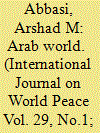

|
|
|
| 2 |
ID:
117385
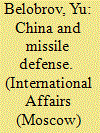

|
|
|
|
|
| Publication |
2012.
|
| Summary/Abstract |
THE UNITED STATES' GLOBAL missile defense system is a far more serious problem for the national security of the People's Republic of China than for Russia, as China's nuclear missile capability is much weaker than Russia's and has lower survivability. Indeed, given that the US and its allies are not particularly secretive about their intentions to form a united front against China, which they claim is challenging the whole Western world - China can't help but cast a wary eye on the plans of bringing US military structures close to its borders.
|
|
|
|
|
|
|
|
|
|
|
|
|
|
|
|
| 3 |
ID:
032455
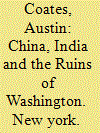

|
|
|
|
|
| Publication |
New York, John Day Company, 1972.
|
| Description |
xii,170p.Hbk
|
|
|
|
|
|
|
|
|
|
|
|
Copies: C:1/I:0,R:0,Q:0
Circulation
| Accession# | Call# | Current Location | Status | Policy | Location |
| 011257 | 915.20095/COA 011257 | Main | On Shelf | General | |
|
|
|
|
| 4 |
ID:
121230
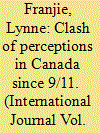

|
|
|
|
|
| Publication |
2012.
|
| Summary/Abstract |
Arab communities in the western world faced public scrutiny in the
aftermath of 11 September 2011. The Canadian Arab community, one of the
country's largest non-European ethnic populations, was no exception.1
This
scrutiny was mostly due to a failure to distinguish between the motivations
and beliefs of the 9/11 attackers and the culture of the Arab and Muslim
communities at large, which were still little-known, although they had been
present in the western world for several decades.
|
|
|
|
|
|
|
|
|
|
|
|
|
|
|
|
| 5 |
ID:
147568
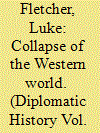

|
|
|
|
|
| Summary/Abstract |
This article examines the thoughts and plans of Dean Acheson and Paul Nitze that led them to the development of NSC 68, the National Security Council document of 1950 that called for rearmament of Europe and solidified the Cold War. It argues that neither the post-1952 European dollar shortage nor the danger of a land invasion of Western Europe were as important to the NSC 68/rearmament decision as the more immediate fear that Germany and/or other European allies were losing their desire to remain in the US-led world-system. The organizing logic of NSC 68 was one of hegemony, which, was neither merely military, economic nor political, but always all three at once. The world system envisaged by Acheson would simply not work, he feared, without the industrial core of central Europe firmly within it; and the principal aim of NSC 68 was to bind Germany to the “free world.”
|
|
|
|
|
|
|
|
|
|
|
|
|
|
|
|
| 6 |
ID:
151166
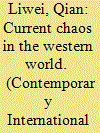

|
|
|
| 7 |
ID:
119875
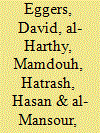

|
|
|
|
|
| Publication |
2013.
|
| Summary/Abstract |
Last year, the San Francisco-based author Dave Eggers published his book, A Hologram for the King, a vision of Saudi Arabia where the Western world of holograms and the Internet comes up against the hard realities of today's Saudi Arabia. Eggers, whose novel was nominated for a National Book Award, spent weeks in the Kingdom researching, meeting an extraordinary Saudi filmmaker whose first feature, Wadjda, premiered at the Venice Film Festival to considerable acclaim, and two Saudis who inspired key characters. World Policy Journal assembled Haifaa al-Mansour, Saudi Arabia's first female film director; Mamdouh al-Harthy, a brilliant journalist and documentary producer, cast in Hologram as a driver who leads the narrator into the depths of the Saudi mind and spirit; and Hasan Hatrash, journalist, filmmaker, and muscian, with a similar role in the novel, who in real life produced the Portfolio in the Winter 2012-2013 issue of World Policy Journal. Eggers served as the moderator for this 90-minute roundtable discussion on art, freedom, and politics in Saudi Arabia and the post-Arab Spring Middle East.
|
|
|
|
|
|
|
|
|
|
|
|
|
|
|
|
| 8 |
ID:
085552
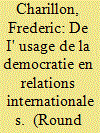

|
|
|
|
|
| Publication |
2008.
|
| Summary/Abstract |
The paper reflects on the end of the post-Cold War triumphalism that had swept the West and also on the belief that democracy could be a cure all solution to the problems of developing and other countries in the new international system. It argues that these were clearly illusions but also that democracy has its place in all cultures, but in a form that is sensitive to local needs and cultures. It points to the dangers of believing that democracy can always be used, internally or externally, in a constructive manner and argues that French thinkers like Bertrand Badie are right to warn us of the dangers of casually importing Western ideas of the state into developing countries in particular.
|
|
|
|
|
|
|
|
|
|
|
|
|
|
|
|
| 9 |
ID:
037364
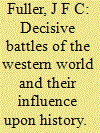

|
|
|
|
|
| Publication |
London, Eyre and spottiswoode, 1965.
|
| Description |
3 vol.set; x, 561p.Hbk
|
| Contents |
Vol.2: from the defeat of the Spanish armada to the battle of waterloo
|
|
|
|
|
|
|
|
|
|
|
|
Copies: C:1/I:0,R:0,Q:0
Circulation
| Accession# | Call# | Current Location | Status | Policy | Location |
| 005022 | 940.2/FUL 005022 | Main | On Shelf | General | |
|
|
|
|
| 10 |
ID:
126682
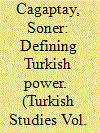

|
|
|
|
|
| Publication |
2013.
|
| Summary/Abstract |
This paper argues that Turkey only partly fits the mold that describes the rising BRICS countries, and so it is useful to designate Turkey as a special case in the rising powers literature. On the one hand, Turkey has gained from the post-Cold War international structure by expanding its outreach to a broader international audience. However, contrary to many common characterizations of other rising powers such as the BRICS, this new position has not recast Turkey as a revisionist actor bent on distancing itself from the West and challenging the Western order, or standalone actor in regional politics. Indeed, it would be incorrect to conflate Turkey's increasing international prominence with growing strategic independence from the West. In fact, Turkey's economic and political ascent remains deeply contingent upon preserving its bonds with the Western world.
|
|
|
|
|
|
|
|
|
|
|
|
|
|
|
|
| 11 |
ID:
163313
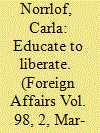

|
|
|
|
|
| Summary/Abstract |
A populist wave is sweeping the Western world. In Austria, Hungary, Italy, Poland, and the United States, populist parties and candidates have entered the government. In France, Germany, Greece, the Netherlands, Sweden, and the United Kingdom, they have won record levels of support and reshaped the political landscape. What makes these victories so disturbing is the characteristic that unites all populists: their rejection of liberal values. If the world once seemed to be moving inexorably toward greater political and economic freedom, human dignity, tolerance, equality, nondiscrimination, open markets, and international cooperation, all are now under threat. That is bad enough, but the decline of liberalism will have consequences beyond a few individual countries. Because the countries that uphold the liberal international order, especially the United States, are turning against liberalism, they risk undermining the order they built, ushering in a more antagonistic and dangerous world.
|
|
|
|
|
|
|
|
|
|
|
|
|
|
|
|
| 12 |
ID:
035476
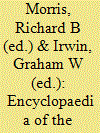

|
|
|
|
|
| Publication |
London, WeidenFeld and Nicolson, 1970.
|
| Description |
xxxii, 1271p.pbk
|
|
|
|
|
|
|
|
|
|
|
|
Copies: C:1/I:0,R:0,Q:0
Circulation
| Accession# | Call# | Current Location | Status | Policy | Location |
| 006294 | 909.080321/MOR 006294 | Main | On Shelf | General | |
|
|
|
|
| 13 |
ID:
034860
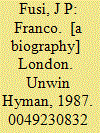

|
|
|
|
|
| Publication |
London, Unwin Hyman, 1987.
|
| Description |
xii, 202p.Hbk
|
| Contents |
Includes biographical notes, terms, glossary, index.
|
| Standard Number |
0049230832
|
|
|
|
|
|
|
|
|
|
|
|
Copies: C:1/I:0,R:0,Q:0
Circulation
| Accession# | Call# | Current Location | Status | Policy | Location |
| 028730 | 923.146/FUS 028730 | Main | On Shelf | General | |
|
|
|
|
| 14 |
ID:
111628
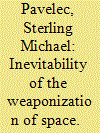

|
|
|
|
|
| Publication |
2012.
|
| Summary/Abstract |
The concept of national security is based on the need to maintain the safety and security of the population. In 1957, the Soviet Union was the first state to threaten this safety in space with the launch of Sputnik. Although Sputnik did not pose a credible threat, it was perceived as such by the Western world. As the space race intensified in the 1960s, efforts were made to prevent the development and use of space weapons. With the 1967 Outer Space Treaty, space weapons were effectively made unlawful, with signatories agreeing to forgo these expensive technologies. However, at the beginning of the twenty-first century, factors and efforts are beginning to converge that indicate the inevitability of space weaponization. Based on a new concept of technological development, this article proposes that as technology advances, space weaponization not only is likely, but indeed is inevitable in the near future. Grounded in the competing theories of technological determinism and social constructivism, I offer a new theory that incorporates both and introduces new components to analyze a near-future technological timeline for space weapons. I argue that the development of these weapons is inevitable and should therefore be accelerated in the United States, given the country's position as the lone superpower, to command and control the space commons. If the United States leads this drive for development, then in the end, as with thermonuclear weapons, space weapons will make the world more, not less, secure, and will contribute to the spread of democratic peace and globalized capitalism.
|
|
|
|
|
|
|
|
|
|
|
|
|
|
|
|
| 15 |
ID:
093660
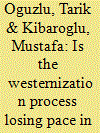

|
|
|
|
|
| Publication |
2009.
|
| Summary/Abstract |
The logic of interest, which has gained considerable ground in foreign policy formulation in Turkey, is not rooted in Western identity, nor is it contingent upon the degree of interaction exclusively with the Western world. The entire world has equal prominence in Turkey's foreign policy orientation. Whether the prevalence of the logic of interest in the formulation of Turkish foreign policy under the "post-Islamist" AKP government signifies a deviation from the Westernization process or whether it is simply a reaction to the conjunctural developments in the international arena in order to preserve Turkey's national interests is seriously debated. This paper aims to contribute to this debate by shedding light on the background of developments both inside and outside Turkey.
|
|
|
|
|
|
|
|
|
|
|
|
|
|
|
|
| 16 |
ID:
080704
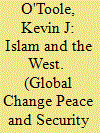

|
|
|
|
|
| Publication |
2008.
|
| Summary/Abstract |
Whether or not the notion of the world as made of civilizations in varying degrees of alliance or conflict is valid, and however reliable or unreliable the idea of an 'Islamic World' or a 'Western World', it is an indisputable reality that there are histories and institutions that are described by and purport to be 'of the West' and 'of Islam'. Indeed, it is commonplace in discourse about international affairs to refer to Islam and the West as distinguishable by values and the 57 nations that comprise the Organization of the Islamic Conference (the OIC) and the 47 nations that comprise the Council of Europe (COE) purport to represent the values respectively of Islam and the West. As usually expressed, however, the frequently used comparative values individualism, piety, liberalism, rule of law, family, abstemiousness and so on are, epistemologically, arguably worthless. Can values be identified for Islam and the West that provide an epistemologically valid distinction? When the OIC and the COE are analysed by reference to what they say and do, the analysis being tested for consistency against the historical origins of these organizations, a case can be made that epistemologically useful respective values can be identified. Thus, for each of the person who will be referred to as 'the Muslim Man' and the person who will be referred to as 'the Western Man', there is distinct doctrine and practice. The doctrine and practice of the Muslim Man extol a virtue of conviction. The doctrine and practice of the Western Man extol a virtue of doubt. For the Muslim Man conviction is unconditional, for the Western Man conviction is contingent; the one enjoys unconditional certainty, the legacy of a revelation; the other suffers reservation, the legacy of an experience of error. What for one is a virtue, for the other is a vice. Their respective dispositions are mutually exclusive.
|
|
|
|
|
|
|
|
|
|
|
|
|
|
|
|
| 17 |
ID:
139270
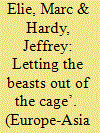

|
|
|
|
|
| Summary/Abstract |
After a lapse of 15 years under Stalin, parole was reintroduced into the Soviet Gulag in 1954. For justice officials anxious to expunge Stalin's repressive legacy, the resurrection of parole signalled a return to correctionalism, societal oversight over the Gulag, and a vastly reduced rate of incarceration. In practice, though, parole exposed significant continuities with the Stalinist Gulag, including endemic corruption, overwhelming concern with production, suspicion of outside interference in penal affairs, and constant upward pressure on the inmate population. In the broader view, the experience of parole in the post-war USSR aligned closely with that of the Western world.
|
|
|
|
|
|
|
|
|
|
|
|
|
|
|
|
| 18 |
ID:
126681
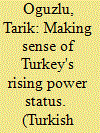

|
|
|
|
|
| Publication |
2013.
|
| Summary/Abstract |
This paper argues that Turkey only partly fits the mold that describes the rising BRICS countries, and so it is useful to designate Turkey as a special case in the rising powers literature. On the one hand, Turkey has gained from the post-Cold War international structure by expanding its outreach to a broader international audience. However, contrary to many common characterizations of other rising powers such as the BRICS, this new position has not recast Turkey as a revisionist actor bent on distancing itself from the West and challenging the Western order, or standalone actor in regional politics. Indeed, it would be incorrect to conflate Turkey's increasing international prominence with growing strategic independence from the West. In fact, Turkey's economic and political ascent remains deeply contingent upon preserving its bonds with the Western world.
|
|
|
|
|
|
|
|
|
|
|
|
|
|
|
|
| 19 |
ID:
121164
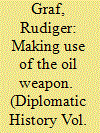

|
|
|
|
|
| Publication |
2012.
|
| Summary/Abstract |
A thorough understanding of the Arab oil-embargo and production cuts of 1973/74 is obscured by attempts to determine its "success" or "failure" on the basis of a simplistic sender/target model. By contrast, this article analyzes the embargo as a communicative process and explores how both the embargoing and the embargoed countries constantly tried to define the contents, purpose, and legitimacy of the measures. Apart from its initially stated goal of pressuring the United States, Western Europe, and Japan to support the Arab countries in the conflict with Israel, various actors in the Arab as well as in the Western world used the embargo for a multitude of different purposes. Their largely symbolic interaction is not secondary for an understanding of the historical significance of the embargo, but the attempts to make use of the "oil-weapon" constituted its very meaning.
|
|
|
|
|
|
|
|
|
|
|
|
|
|
|
|
| 20 |
ID:
151168
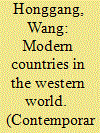

|
|
|
|
|
|
|
|